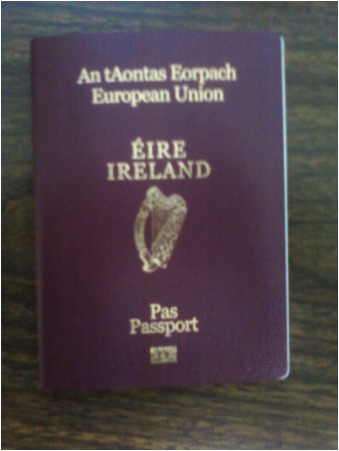|
The young lady in the change booth at Heathrow inspected my maroon Éire passport. “So, you are a plastic Paddy?” she said. This was my first time using my passport, two decades ago, and I was feeling quite proud. The shiny new passport had already gotten me through the European Union lane, quicker than the regular Arrivals lane, but now the change agent put me in my place. My newness, my American-ness, came through. Plastic, indeed. I think about her every St. Patrick’s Day when I rummage around for some vaguely green sweater or tie but decline to join any parade that might be taking place. My second passport, beside my beloved American passport, is courtesy of my grandmother, born in County Waterford in 1875. We lived under the same roof until she died when I was twelve (actually, it was her house, thrifty woman that she was) but I don’t recall her ever talking about the Ireland she left as a teen-ager. (I wrote about her three years ago.) Being Irish, via a maroon passport, is a state of mind, and I claim to be Irish, deep down inside. I say it is the moody, emotional side, the side that cares. I love to hear the trace of an Irish accent, particularly in women, newscasters on the BBC or Euro News, or the lovely staff at Foley’s on W. 33rd St., and a few friends (they know who they are.) Last Sunday, Christine Lavin was filling in for John Platt on WFUV-FM, and was host to Maxine Linehan in the studio, singing “Danny Boy” live. (This is not a song most artists rush to perform, just as jazz musicians charge extra for “When the Saints Go Marching In” at Preservation Hall.) But Linehan sang “Danny Boy” and damned if I didn’t get tears in my eyes. Being Irish is part genetic – and part choice. I had a three-week binge on “Ulysses” back at Hofstra, and now I re-read it every five years or so. I am touched by Seamus Heaney and Frank McCourt and the plays of Brian Friel and Sean O’Casey. My wife, with her own spouse passport, talks about a visit to Galway or Cork. Our one visit to Ireland (Canadians and Australians and Americans buying all kinds of green souvenirs), I remember the way old men chattered with each other, and one old lady who stopped us on a street corner in Ballsbridge and apologized for the heat wave. (It was 75 Fahrenheit, in July.) I file away some terrible things that have happened on the island. Life is complicated. But there are few days when I don’t remember the maroon passport in my desk, and my grandmother’s gift. * * * (Maxine Linehan, below. Go for it, it's St. Patrick's Day.) 3/18/2015 05:49:27 am
George
George Vecsey
3/18/2015 07:27:07 am
Alan, you are truly a renaissance kind of guy. 3/18/2015 09:13:38 am
George--I'm not sure that I qualify for a renaissance label, but at my age you have to called something.
George Vecsey
3/18/2015 01:20:39 pm
Alan, I agree with that these days, now that YS is a theme park, could be plopped down anywhere. The old place, even the revision, had some character, as dark and gloomy as it was.
John McDermott
3/22/2015 12:23:12 am
I treasure my Irish passport, and my dual nationality. I've always felt, since childhood, that while I had been born in Philadelphia there was something always calling elsewhere, and not just Ireland but many places, and that while I was born an American, a descendant of the Irish diaspora, I never felt myself to be only an American. The real irony in this, as you know George, is that my Irish and EU citizenship will allow me to live in Italy, the country where I now feel most at home. Comments are closed.
|
Categories
All
|










